In the weeks before President-elect Iván Duque takes office in Colombia, the Brookings Institution hosted a discussion exploring the country’s current dynamics and U.S.-Colombia relations.
The event featured Juan Carlos Pinzón—former Colombian minister of defense and ambassador to the United States, as well as 2017 presidential candidate in Colombia—and Brookings Senior Fellows Vanda Felbab-Brown and Michael O’Hanlon.
Commenting that it’s “an exciting time to talk Colombia,” O’Hanlon described the anticipation surrounding Duque’s imminent inauguration, in addition to framing the broader scene.
Duque will be Colombia’s youngest president, and he faces numerous challenges right off the bat, O’Hanlon said. Although the democratic country’s institutions have fared much better than many of its neighbors over the years, there has been trouble as well: violence among insurgent and criminal groups, increasing drug production and trafficking, a weakened economy, and instability in and refugee flows from neighboring Venezuela. Duque has also promised to make significant changes to a peace deal with the FARC.
Pinzón discussed his own time on the campaign trail ahead of this summer’s presidential elections in Colombia. He called it as a wonderful opportunity to connect with the people, especially as someone who has spent his career in the policy world. Although he ran for president himself in the election, Pinzón reiterated strong backing for President-elect Duque, saying that “President Duque requires a lot of support” and that those in a position to facilitate the new administration’s efforts should do so, as it is important for the country.
Felbab-Brown—an expert on nontraditional security threats, including illicit economies—has spent much time on the ground in Colombia. She said of the elections process: “One of the things that struck me about the election was actually not so much the polarization.” She went on, “in my view a healthy development was some of the coalescing of the left.” A long-term problem for Colombia has been a weak and fragmented left. Such division and weakness on one part of the political spectrum is “just not healthy for a country,” she noted.
Broadening the topic beyond the election, O’Hanlon asked the panelists to identify the biggest challenge facing Colombia today.
Pinzón called the peace process with the FARC a main obstacle ahead under Duque and the elephant in the room. During his campaign, Duque promised to “modify” (in Duque’s words) the deal, and in Pinzón’s words people who helped elect him expect him to “enhance the peace process, and enhancing the peace process has several requirements and challenges.” Pinzón detailed the main challenges: ensuring justice, following the agenda set by the people regarding drug trafficking not being considered a political crime, developing rural areas, and finding an effective counter-narcotics policy.
Throughout the conversation, Pinzón reminded the audience that Colombia is not just a country afflicted with drug trafficking (a misperception that bothers many Colombians)—there are host of other issues, and moving forward, he argued, Colombia must focus on keeping the economy healthy and competitive. Social and quality of life issues are paramount, he added. For instance on pension reform, “around half of the people [of Colombia] do not get any kind of pension, or any kind of government support when they get to pension age, it’s a very delicate social issue.” Even today, when the Colombian population is relatively young, pensions are a huge portion of the budget and a key voting issue.
Felbab-Brown said: “For me, the fundamental point for Colombia [was] exactly the same before the elections as it [is] after the elections. And that is whether the country will actually manage to overcome the historic exclusion and impunity, and bifurcation of the country that have really defined it.” Much as Pinzón earlier emphasized that rural development should be a critical early focus of the new administration, Felbab-Brown repeatedly stressed the problematic urban-rural divide and the latter’s development needs.
She also raised concerns about the Duque administration’s likely approach to the 2016 peace accords—including their rural development aspects—which she detailed in a recent blog post. Felbab-Brown argued that a “zero coca approach” is deeply misguided, explaining that it “demands that for a community to qualify for real development, the entire region…needs to eliminate all coca. And only then will it qualify for sustained aid.” While it is not what Bogotá or Washington wants to hear, countries that have most successfully (and sustainably) reduced drug crops have “allowed some development to take place for a number of years, and only then started eradicating.” In short, she argued that drug crops cannot be effectively suppressed unless the population also gains access to legal livelihood opportunities.
Pinzón said he “understands we have to confront” the illicit drug economy in Colombia, adding that the government needs to offer strong alternatives to growing coca. He also believes that eradication can be effective, and that targeting from the air can be useful. (Aerial crop spraying in Colombia has not been permitted since 2015 due to health concerns, but a return using drones is being planned.) Pinzón pointed out some oversimplifications from detractors on the matter, and described how eradication is a necessary tool in the larger battle, “especially to tackle the criminal finances.” He also argued that eradication has been successful in large parts of the country in the past, and that eradication matters because Colombia needs absolute prohibition of the crops. Beyond that, Pinzón made clear that it’s not just eradication: Rural Colombia needs roads and a state presence in general, as well as “frankly speaking, an alternative economy.”
Felbab-Brown countered that forced aerial eradication, whether by drones or not, will generate the same problems as before: lack of sustainability, political opposition, and social marginalization, as she details in a recent blog post. Rather than supporting forced eradication, she said: “What Washington should be doing is engaging with Colombia into how to sustain inclusion and equitable development.” While much of that focus is on the rural parts of the country, it should also include the urban areas.
Sustainable and equitable development will be a decades-long project, she added, pointing out that, for example, functioning rule of law is absent from large parts of the country. As such, she concluded that it is an “unrealistic expectation that all of this can be rolled out across the country at once.” Instead, she argued for a sequential approach “by concentrating on priority areas and gradually expanded them,” acknowledging that there will be political difficulties regarding communities that do not initially receive assistance.
Pinzón tended to agree. He reiterated earlier comments, saying: “We need to focus very much on making Colombia attractive for investors, we need job creation, we need sources of income, and we need to make Colombia competitive.”
The Brookings Institution is committed to quality, independence, and impact.
We are supported by a diverse array of funders. In line with our values and policies, each Brookings publication represents the sole views of its author(s).

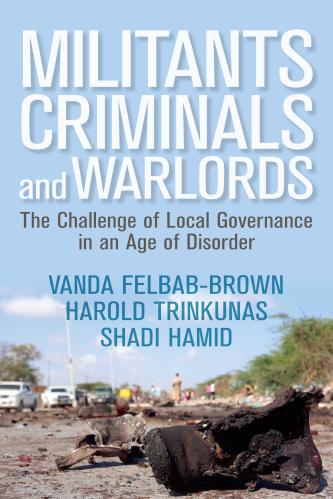
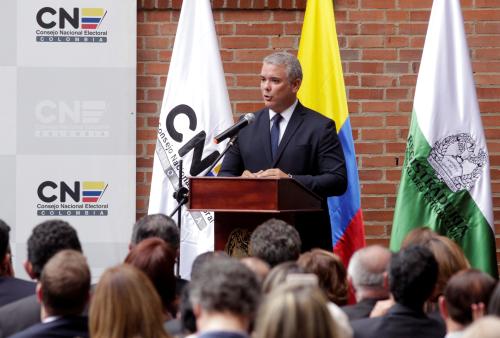
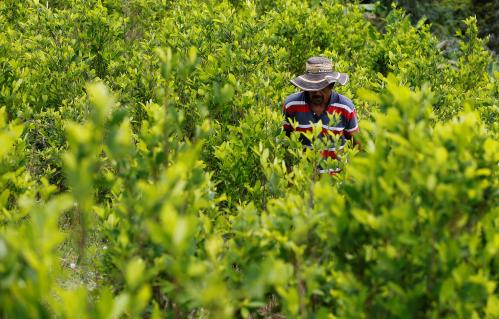
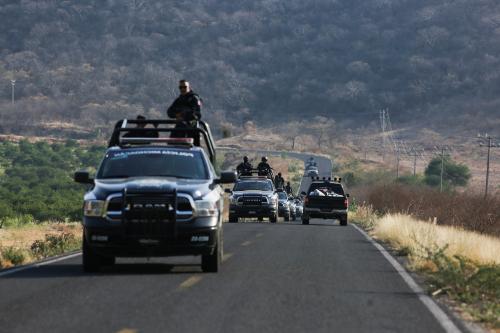
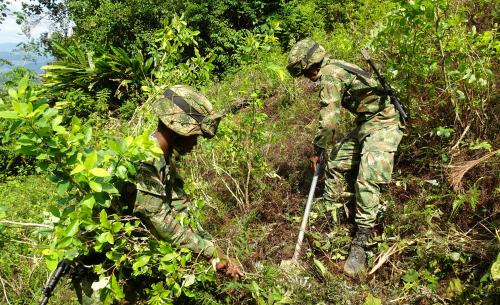
Commentary
Experts discuss developments in Colombia and President-elect Iván Duque
August 6, 2018